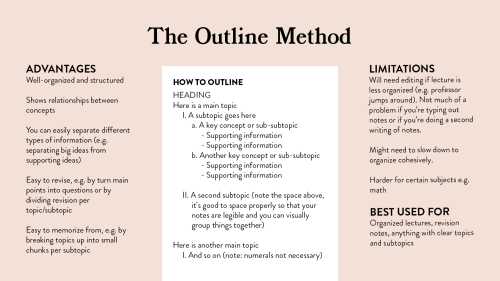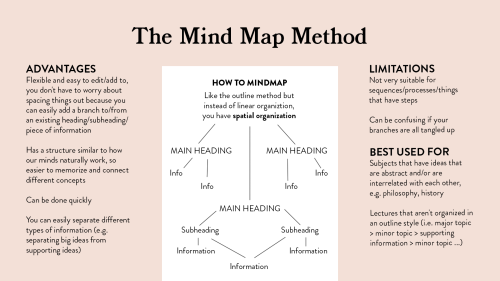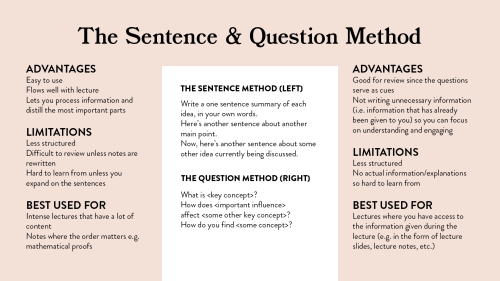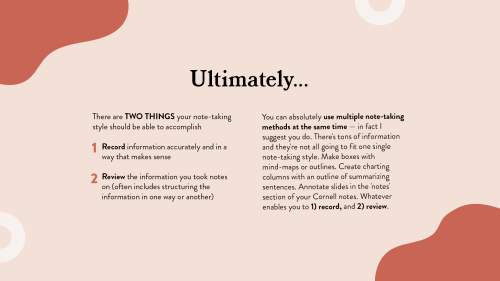Tips For Studying Math Part 2:
tips for studying math part 2:
studying for an exam but the course is super boring and you don't care about it at all, you just want to pass
start by making a list of topics that were covered in lectures and classes. you can try to sort them by priority, maybe the professor said things like "this won't be on the exam" or "this is super important, you all must learn it", but that's not always possible, especially if you never showed up in class. instead, you can make a list of skills that you should acquire, based on what you did in classes and by looking at the past papers. for example, when I was studying for the statistics exam, my list of skills included things such as calculating the maximum likelihood estimators, confidence intervals, p-values, etc.
normally it is recommended to take studying the theory seriously, read the proofs, come up with examples, you name it, but we don't care about this course so obviously we are not going to do that. after familiarizing yourself with the definitions, skim through the lecture notes/slides/your friend's notes and try to classify the theorems into actionable vs non-actionable ones. the actionable ones tell you directly how to calculate something or at least that you can do it. the stokes theorem or the pappus centroid theorem – thore are really good examples of that. they are the most important, because chances are you used them a lot in class and they easily create exam problems. the non-actionable theorems tell you about properties of objects, but they don't really do anything if you don't care about the subject. you should know them of course, sometimes it is expected to say something like "we know that [...] because the assumptions of the theorem [...] are satisfied". but the general rule of thumb is that you should focus on the actionable theorems first.
now the problem practice. if you did a lot of problems in class and you have access to past papers, then it is pretty easy to determine how similar those two are. if the exercises covered in class are similar to those from past exam papers, then the next step is obvious: solve the exercises first, then work on the past papers, and you should be fine. but this is not always the case, sometimes the classes do not sufficiently prepare you for the exam and then what you do is google "[subject] exercises/problems with solutions pdf". there is a lof of stuff like this online, especially if the course is on something that everybody has to go through, for instance linear algebra, real and complex analysis, group theory, or general topology. if your university offers free access to textbooks (mine does, we have online access to some books from springer for example) then you can search again "[subject] exercises/problems with solutions". of course there is the unethical option, but I do not recommend stealing books from libgen by searching the same phrase there. once you got your pdfs and books, solve the problems that kinda look like those from the past papers.
if there is a topic that you just don't get and it would take you hours to go through it, skip it. learn the basics, study the solutions of some exercises related to it, but if it doesn't go well, you can go back to it after you finish the easy stuff. it is more efficient to learn five topics during that time than to get stuck on one. the same goes for topics that were covered in lectures but do not show up on the past papers. if you don't have access to the past papers you gotta trust your intuition on whether the topic looks examable or not. sometimes it can go wrong, in particular when you completely ignored the course's existence, but if you cannot find any exercises that would match that topic, then you can skip it and possibly come back later. always start with what comes up the most frequently on exams and go towards what seems the most obscure. if your professor is a nice person, you can ask them what you should focus on and what to do to prepare, that can save a lot of time and stress.
talk to the people who already took the course. ask them what to expect – does the professor expect your solutions to be super precise and cuts your points in half for computation errors or maybe saying that the answer follows from the theorem X gets the job done? normally this wouldn't be necessary (although it is always useful to know these things) because when you care about the course you are probably able to give very nice solutions to everything or at least that's your goal. but this time, if many people tell you that the professor accepts hand-wavey answers, during the exam your tactic is to write something for every question and maybe you'll score some extra points from the topics you didn't have time to study in depth.
alright, that should do it, this is the strategy that worked for me. of course some of those work also in courses that one does care about, but the key here is to reduce effort and time put into studying while still maximizing the chances of success. this is how I passed statistics and differential equations after studying for maybe two days before each exam and not attending any lectures before. hope this helps and of course, feel free to add yours!
More Posts from Bsdndprplplld and Others
rb this with ur opinion on this shade of pink:

Real estate agent, 5 minutes into the meeting with a topologist: So, when you were talking about "contracting" a "house with two rooms",

“A lot of math grad school is reading books and papers and trying to understand what’s going on. The difficulty is that reading math is not like reading a mystery thriller, and it’s not even like reading a history book or a New York Times article.
The main issue is that, by the time you get to the frontiers of math, the words to describe the concepts don’t really exist yet. Communicating these ideas is a bit like trying to explain a vacuum cleaner to someone who has never seen one, except you’re only allowed to use words that are four letters long or shorter.
What can you say?
“It is a tool that does suck up dust to make what you walk on in a home tidy.”
That’s certainly better than nothing, but it doesn’t tell you everything you might want to know about a vacuum cleaner. Can you use a vacuum cleaner to clean bookshelves? Can you use a vacuum cleaner to clean a cat? Can you use a vacuum cleaner to clean the outdoors?
The authors of the papers and books are trying to communicate what they’ve understood as best they can under these restrictions, and it’s certainly better than nothing, but if you’re going to have to work with vacuum cleaners, you need to know much more.
Fortunately, math has an incredibly powerful tool that helps bridge the gap. Namely, when we come up with concepts, we also come up with very explicit symbols and notation, along with logical rules for manipulating them. It’s a bit like being handed the technical specifications and diagrams for building a vacuum cleaner out of parts.
The upside is that now you (in theory) can know 100% unambiguously what a vacuum cleaner can or cannot do. The downside is that you still have no clue what the pieces are for or why they are arranged the way they are, except for the cryptic sentence, “It is a tool that does suck up dust to make what you walk on in a home tidy.”
OK, so now you’re a grad student, and your advisor gives you an important paper in the field to read: “A Tool that does Suck Dust.” The introduction tells you that “It is a tool that does suck up dust to make what you walk on in a home tidy,” and a bunch of other reasonable but vague things. The bulk of the paper is technical diagrams and descriptions of a vacuum cleaner. Then there are some references: “How to use air flow to suck up dust.” “How to use many a coil of wire to make a fan spin very fast.” “What you get from the hole in the wall that has wire in it.”
So, what do you do? Technically, you sit at your desk and think. But it’s not that simple. First, you’re like, lol, that title almost sounds like it could be sexual innuendo. Then you read the introduction, which pleasantly tells you what things are generally about, but is completely vague about the important details.
Then you get to the technical diagrams and are totally confused, but you work through them piece by piece. You redo many of the calculations on your own just to double check that you’ve really understood what’s going on. Sometimes, the calculations that you redo come up with something stupid, and then you have to figure out what you’ve understood incorrectly, and then reread that part of the technical manual to figure things out. Except sometimes there was a typo in the paper, so that’s what screwed things up for you.
After a while, things finally click, and you finally understand what a vacuum cleaner is. In fact, you actually know much more: You’ve now become one of the experts on vacuum cleaners, or at least on this particular kind of vacuum cleaner, and you know a good fraction of the details on how it works. You’re feeling pretty proud of yourself, even though you’re still a far shot from your advisor: They understand all sorts of other kinds of vacuum cleaners, even Roombas, and, in addition to their work on vacuum cleaners, they’re also working on a related but completely different project about air conditioning systems.
You are filled with joy that you can finally talk on par with your advisor, at least on this topic, but there is a looming dark cloud on the horizon: You still need to write a thesis.
So, you think about new things that you can do with vacuum cleaners. So, first, you’re like: I can use a vacuum cleaner to clean bookshelves! That’d be super-useful! But then you do a Google Scholar search and it turns out that someone else did that like ten years ago.
OK, your next idea: I can use a vacuum cleaner to clean cats! That’d also be super-useful. But, alas, a bit more searching in the literature reveals that someone tried that, too, but they didn’t get good results. You’re a confident young grad student, so you decide that, armed with some additional techniques that you happen to know, you might fix the problems that the other researcher had and get vacuuming cats to work. You spend several months on it, but, alas, it doesn’t get you any further.
OK, so then, after more thinking and doing some research on extension cords, you think it would be feasible to use a vacuum cleaner to clean the outdoors. You look in the literature, and it turns out that nobody’s ever thought of doing that! You proudly tell this idea to your advisor, but they do some back of the envelope calculations that you don’t really understand and tell you that vacuuming the outdoors is unlikely to be very useful. Something about how a vacuum cleaner is too small to handle the outdoors and that we already know about other tools that are much better equipped for cleaning streets and such.
This goes on for several years, and finally you write a thesis about how if you turn a vacuum cleaner upside-down and submerge the top end in water, you can make bubbles!
Your thesis committee is unsure of how this could ever be useful, but it seems pretty cool and bubbles are pretty, so they think that maybe something useful could come out of it eventually. Maybe.
And, indeed, you are lucky! After a hundred years or so, your idea (along with a bunch of other ideas) leads to the development of aquarium air pumps, an essential tool in the rapidly growing field of research on artificial goldfish habitats. Yay!”
saving this for self-care and for anyone who might need this
also, I can add: squint your eyes hard and then looking at something far away. it's supposed to help your eyes relax and a bonus simple grounding exercise!
from my personal experience, once you start paying attention to how different it feels on your eyes to look at something far away as opposed to something close, you can relax your eyes without needing an object to look at. now when I'm going to bed I imagine a tree far away and I feel my eyes relaxing, it helps with me fall alseep faster. it might be a placebo ofc, I know nothing about eyes, but it is still a good trick for falling asleep regardless of the supposed effect of it on the eyes
We need like “unclench your jaw” posts but for eye strain. Like
Go look at something 20ft away for 20 seconds.
(Points at the function I'm doing my thesis on) this is my son who has every disease

Visualization of the Rubik's cube









An Overview of Note-Taking Styles
Note-taking is one of the most essential skills a student should master. It allows you to record and review information to be used in the future. But what’s the best way to do so? Here’s an overview of note-taking styles that can help you maximize your learning!
– so what do you do in math?
– algebraic topology, you?
– ugh I always hated algebra. I do probability theory
– ugh I was never any good at probablity theory

Mathematicians be like:
Def 1.1: A function f is fucked-up iff it is not Lebesgue measurable
Def 1.2: A function is evil iff its graph has non-integer Hausdorff dimension.
Exercise 1: Prove that there exist fucked-up and evil functions
1 X 2022
new month huh
yesterday the commutative algebra teacher sent out the first homework assignment. you know, fuck the holiday, we need that grind
I have a week to solve it but I started yesterday as I was so excited

we need to prove some elementary properties of commutative unitary rings and I am enjoying it, I completed a half of the exercises so far. I can tell that the intuition acquired from studying module theory is paying off. many of the requested properties are the special cases of what I encountered during my module venture, so I feel like I understand them quite well. the problem I come across is how to write it down in a rigorous way, but I guess this is why we're supposed to do those exercises
I just got home from the math camp, it was so exhausting. I am not used to being around people all the time, so I my tolerance for interactions is low. I'm glad I went there tho, because I gained some teaching experience – my lecture, choosing contest problems and then grading the solutions
my university offers jobs as graders, older students can make some extra money checking homeworks of younger ones. the requirement is to have a decent GPA, which I don't have so I'm afraid they won't accept me. I don't know how decent exactly tho, so I'm going to try. in particular I might get bonus points for my extracurricular activities, giving talks at conferences and the grading I did at the camp. I'm so done with being poor, I hope I get in. otherwise I might start looking for some programming jobs, not for this academic year but in general, to find out what I could do at all
a few days ago I found a book that I wish I had found sooner: Vector Analysis, Klaus Janich




these are some of the chapters I needed a few months ago for my analysis course. the book is written like a novel and contains many interesting examples. on the bright side there are chapters about riemannian manifolds and other stuff that I haven't yet had an opportunity to study, so I plan to skim through the topics I already know and stay longer at those new to me
well, the sememster starts on tuesday so I don't have much time for that book, but as a sidequest it seems just right
-
 evilmoriarty liked this · 2 months ago
evilmoriarty liked this · 2 months ago -
 saprobiont liked this · 8 months ago
saprobiont liked this · 8 months ago -
 79g73g liked this · 10 months ago
79g73g liked this · 10 months ago -
 ros3ybabe liked this · 1 year ago
ros3ybabe liked this · 1 year ago -
 irenetheroyal liked this · 1 year ago
irenetheroyal liked this · 1 year ago -
 mulkadesa liked this · 1 year ago
mulkadesa liked this · 1 year ago -
 seededcroissant liked this · 1 year ago
seededcroissant liked this · 1 year ago -
 pain-matrix liked this · 1 year ago
pain-matrix liked this · 1 year ago -
 teascheeseandstudies reblogged this · 1 year ago
teascheeseandstudies reblogged this · 1 year ago -
 bloom-anew liked this · 1 year ago
bloom-anew liked this · 1 year ago -
 ackee-fried-mofongo reblogged this · 1 year ago
ackee-fried-mofongo reblogged this · 1 year ago -
 ackee-fried-mofongo liked this · 1 year ago
ackee-fried-mofongo liked this · 1 year ago -
 speronyx liked this · 1 year ago
speronyx liked this · 1 year ago -
 this-barbie-is-on-effexor reblogged this · 1 year ago
this-barbie-is-on-effexor reblogged this · 1 year ago -
 wizard-of-argead liked this · 1 year ago
wizard-of-argead liked this · 1 year ago -
 coquetteletters liked this · 1 year ago
coquetteletters liked this · 1 year ago -
 microfun1 liked this · 1 year ago
microfun1 liked this · 1 year ago -
 red-girl13 liked this · 1 year ago
red-girl13 liked this · 1 year ago -
 kims2 liked this · 1 year ago
kims2 liked this · 1 year ago -
 annahmiraculousmillenium liked this · 1 year ago
annahmiraculousmillenium liked this · 1 year ago -
 stagskulls liked this · 1 year ago
stagskulls liked this · 1 year ago -
 sexaintfunkyfresh liked this · 1 year ago
sexaintfunkyfresh liked this · 1 year ago -
 teepuru liked this · 1 year ago
teepuru liked this · 1 year ago -
 yes4defenestration liked this · 1 year ago
yes4defenestration liked this · 1 year ago -
 xibalbaa liked this · 1 year ago
xibalbaa liked this · 1 year ago -
 unnecessaryrainbow liked this · 1 year ago
unnecessaryrainbow liked this · 1 year ago -
 linceon liked this · 1 year ago
linceon liked this · 1 year ago -
 crediblesource liked this · 1 year ago
crediblesource liked this · 1 year ago -
 theawesometdog liked this · 1 year ago
theawesometdog liked this · 1 year ago -
 sleepy-autumns-world liked this · 1 year ago
sleepy-autumns-world liked this · 1 year ago -
 catboybrain reblogged this · 1 year ago
catboybrain reblogged this · 1 year ago -
 angelogistics liked this · 1 year ago
angelogistics liked this · 1 year ago -
 sailing-forth reblogged this · 1 year ago
sailing-forth reblogged this · 1 year ago -
 scarredstars-blog liked this · 1 year ago
scarredstars-blog liked this · 1 year ago -
 ettolrach-uwu reblogged this · 1 year ago
ettolrach-uwu reblogged this · 1 year ago -
 ettolrach-uwu liked this · 1 year ago
ettolrach-uwu liked this · 1 year ago -
 gracefullysaint liked this · 1 year ago
gracefullysaint liked this · 1 year ago -
 mysanityisquestionable liked this · 1 year ago
mysanityisquestionable liked this · 1 year ago -
 notarealwelder liked this · 1 year ago
notarealwelder liked this · 1 year ago -
 lurking00 liked this · 1 year ago
lurking00 liked this · 1 year ago -
 some-random-sapphic liked this · 1 year ago
some-random-sapphic liked this · 1 year ago -
 luicosas reblogged this · 1 year ago
luicosas reblogged this · 1 year ago -
 yellowisharo reblogged this · 1 year ago
yellowisharo reblogged this · 1 year ago

⁕ pure math undergrad ⁕ in love with anything algebraic ⁕
292 posts